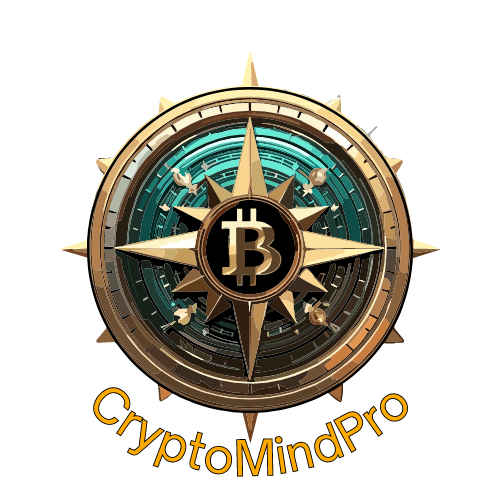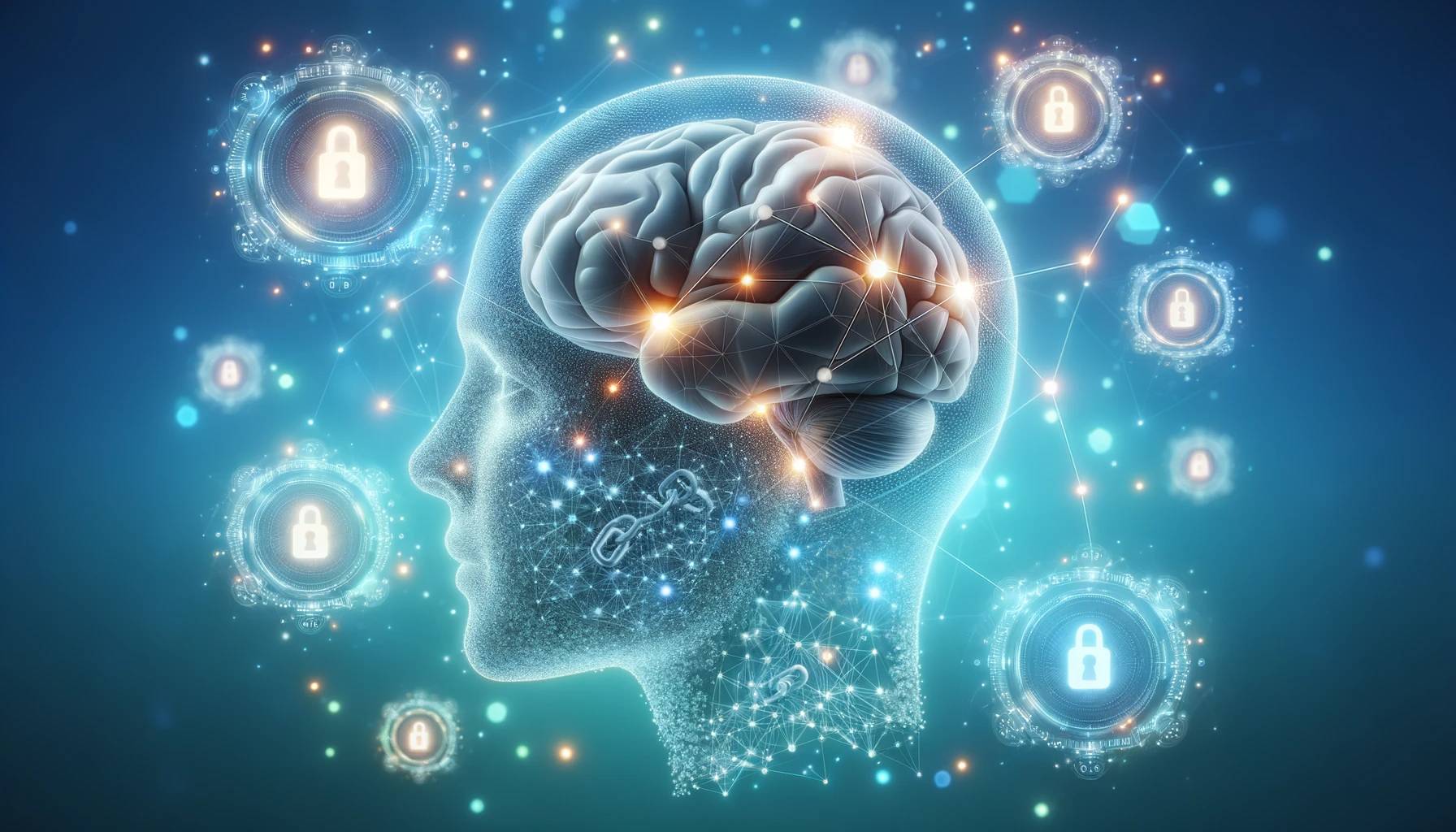The term “Mental Health Blockchain” sparks a dialogue at the intersection of technology and well-being. In recent times, mental health has emerged from the shadows, becoming a topic of open discussion and concern.
Similarly, blockchain technology, typically known for its role in powering cryptocurrencies, is stepping beyond financial borders to offer innovative solutions in various fields.
Among these new horizons is the realm of mental health. The fusion of blockchain technology with mental health practices holds a promise of revolutionizing how we manage and discuss mental health issues.
This article aims to explore this exciting intersection, shedding light on how blockchain could potentially redefine mental healthcare.
Key Takeaways
Section Title Key Insights Blockchain in Mental Healthcare Secure data management, patient empowerment Integrative Approaches Convergence science, AI integration Real-World Implementations Mind Blockchain platform, other existing frameworks NFTs and Mental Health Art, collectibles, and charitable initiatives Blockchain’s Transformative Impact Case studies showcasing positive impact
With a blend of curiosity and a dash of technical insight, let’s embark on a journey to understand how blockchain technology could be a beacon of change in the mental health sector, creating a bridge between cutting-edge technology and the humane aspect of mental health care.
Blockchain in Mental Healthcare
Blockchain technology, often hailed for its revolutionary role in the financial domain, presents a vault of untapped potential when it comes to mental healthcare.
Its inherent features of decentralization, transparency, and immutability stand as pillars that could redefine the way we approach mental health management.
Secure Data Management
One of the paramount concerns in mental healthcare is the secure management and sharing of sensitive patient data. Blockchain technology, with its decentralized nature, presents a viable solution. Here’s how:
- Data Encryption: Ensuring that the data is encrypted and only accessible to authorized individuals.
- Immutable Records: Once data is recorded on a blockchain, it cannot be altered, ensuring the integrity of medical records.
- Transparent Audit Trails: Every transaction on the blockchain is recorded, creating a transparent audit trail.
By ensuring a secure and transparent method of handling patient data, blockchain technology could significantly enhance trust and efficiency in mental health systems.
This can be further explored in our article on how blockchain technology in healthcare is redefining patient care.
Patient Empowerment
Empowering patients to have control over their own medical records is a crucial step towards a more patient-centric healthcare model. Blockchain facilitates this by:
- Access Control: Patients can control who accesses their data, and grant permissions accordingly.
- Ownership: Patients have ownership of their data, a shift from the traditional model where data is owned by healthcare providers.
| Criterion | Traditional Model | Blockchain-Based Model |
| Data ownership | Centralized with healthcare providers | Decentralized with patients |
| Data control | Patients have limited control over their data | Patients have full control over their data |
| Data access | Healthcare providers have access to patient data without patient consent | Patients control who has access to their data |
| Data security | Patient data is vulnerable to hacking and data breaches | Patient data is secured by cryptography |
| Transparency | Limited transparency into how patient data is used | Full transparency into how patient data is used |
Regulatory Compliance
Healthcare institutions have to adhere to various regulatory standards, which often require robust data management and privacy measures. Blockchain could ease the compliance process through:
- Smart Contracts: Automating certain compliance processes using smart contracts, reducing the administrative burden.
- Consent Management: Streamlining the process of obtaining and managing patient consents for data sharing.
By automating and streamlining several compliance-related processes, blockchain technology could potentially reduce the administrative burden on mental healthcare institutions, allowing them to focus more on patient care.
The application of blockchain in mental healthcare is a beacon of hope for establishing secure, transparent, and patient-centric systems.
By addressing some of the core challenges in data management and patient empowerment, blockchain technology could indeed play a vital role in propelling the mental healthcare sector into a new era of innovation and trust.
Integrative Approaches: Convergence Science and AI
The exploration of blockchain in mental healthcare doesn’t exist in a silo. It’s part of a larger narrative where different technological avenues converge to create a comprehensive solution.
This section delves into the integrative approaches of convergence science and Artificial Intelligence (AI) in blockchain-based mental health solutions.
Convergence Science
Convergence science is an interdisciplinary field that brings together different branches of science and technology to create holistic solutions.
In the context of mental healthcare, it facilitates the amalgamation of blockchain with other technologies to address various challenges. Here’s how:
- Collaborative Research: Facilitating collaborative research between technologists, healthcare professionals, and patients to identify and address core challenges.
- Innovative Solutions: Creating innovative solutions by blending blockchain with other technologies like AI, Machine Learning, and Internet of Things (IoT).
AI Integration
Artificial Intelligence (AI) and blockchain together open up new horizons in mental healthcare. While blockchain ensures secure and transparent data management, AI contributes through predictive analysis and personalized care. The synergies include:
- Predictive Analysis: AI can analyze vast amounts of data to predict potential mental health issues, enabling early intervention.
- Personalized Care: Leveraging AI to provide personalized care plans based on individual’s data, securely managed on a blockchain.
- Enhanced Telemedicine: Enhancing remote patient monitoring and telemedicine by ensuring secure data transmission and real-time analysis.
Real-Time Decision Making
Combining real-time data analytics with blockchain’s secure data management can significantly enhance decision-making processes in mental healthcare. The integration facilitates:
- Real-Time Monitoring: Continuously monitoring patients’ health data in real-time to provide timely interventions.
- Informed Decision Making: Providing healthcare professionals with the necessary data to make informed decisions promptly.
The fusion of blockchain with AI and convergence science is akin to opening new doors in the realm of mental healthcare.
This integrative approach not only addresses the challenges in data management and security but also paves the way for innovative solutions that could redefine patient care and treatment methodologies.
Through how blockchain technology in healthcare is redefining patient care, we can begin to fathom the profound impact this technological amalgam could have on mental healthcare.
Real-World Implementations
The theoretical explorations of Mental Health Blockchain are well-grounded in real-world implementations.
Several projects and platforms are venturing into the realm of mental healthcare, leveraging blockchain’s robust capabilities.
Other Existing Frameworks
Various frameworks and platforms are adopting blockchain technology to address mental healthcare challenges:
- Secure Data Sharing: Frameworks that facilitate secure sharing of mental health data among various stakeholders.
- Patient Empowerment: Platforms that empower patients with control over their own mental health data.
- Research Advancements: Blockchain aiding in research advancements by ensuring the integrity and accessibility of research data.
Challenges and Lessons Learned
Every innovation comes with its set of challenges and lessons.
Some of the challenges faced in real-world implementations include:
- Scalability: Blockchain solutions need to scale to accommodate growing data and user base.
- User Acceptance: Ensuring user acceptance and understanding of blockchain-based mental health solutions.
- Regulatory Compliance: Navigating the complex regulatory landscape of healthcare and blockchain.
The lessons learned from these real-world implementations provide invaluable insights that could shape the future trajectories of Mental Health Blockchain.
They demonstrate the potential and the hurdles in merging blockchain with mental healthcare, offering a realistic glimpse into the future of this promising fusion.
Real-world implementations bring the concept of Mental Health Blockchain from abstract to concrete, demonstrating the tangible benefits and challenges of this innovative fusion.
Through understanding the practical applications and lessons learned, we can better appreciate the potential impact and the road ahead for blockchain in mental healthcare.
NFTs and Mental Health: A New Avenue
The realm of Non-Fungible Tokens (NFTs) is typically associated with digital art and collectibles.
However, a deeper dive reveals its potential to serve as a catalyst for mental health awareness and wellbeing.
This section explores the fascinating intersection of NFTs, blockchain, and mental health, illustrating how digital assets can promote a positive mental health discourse.
Art, Collectibles, and Charitable Initiatives
The digital nature of NFTs, coupled with blockchain’s secure and transparent infrastructure, paves the way for innovative mental health initiatives:
- Therapeutic Art: Digital art as a form of therapy, where individuals can express, explore, and address their mental health issues.
- Collectibles for Awareness: NFT collectibles aimed at raising awareness about mental health, with a portion of sales directed towards mental health organizations.
- Charitable Auctions: NFT auctions where proceeds go towards mental health research and support services.
Community Building and Support
NFTs and blockchain can foster a community-centric approach towards mental health:
- Online Communities: Building supportive online communities around mental health-themed NFT collections.
- Peer Support: Blockchain-based platforms facilitating peer support and counseling, securely and anonymously.
Promoting Wellbeing
The fusion of NFTs and blockchain transcends beyond mere digital assets, venturing into promoting mental wellbeing:
- Mindfulness Programs: NFTs unlocking access to mindfulness and wellness programs.
- Reward Systems: Blockchain-based reward systems encouraging positive mental health behaviors.
The convergence of NFTs, blockchain, and mental health showcases a novel approach to promoting mental wellbeing and community support. It’s a testament to the boundless possibilities that emerge when technology is employed with empathy and purpose.
Blockchain’s Transformative Impact
The integration of blockchain technology in the mental health sector has the potential to usher in a new era of enhanced care, streamlined processes, and empowered patients.
This section delves into the transformative impact blockchain could have on mental healthcare, exploring real-world examples and potential future scenarios.
Case Studies Showcasing Positive Impact
Real-world case studies are instrumental in demonstrating the transformative potential of blockchain in mental healthcare:
- Secure Data Sharing: Examples of healthcare institutions leveraging blockchain for secure and transparent sharing of mental health data.
- Enhanced Treatment Coordination: Case studies illustrating how blockchain facilitates better coordination among healthcare professionals, leading to improved treatment plans for patients.
- Patient Empowerment: Instances where blockchain has empowered patients with control over their own mental health data, fostering a more patient-centric healthcare model.
Future Implications
The journey of blockchain in mental healthcare is just beginning, with numerous implications for the future:
- Advanced Research: Blockchain enabling advanced research by ensuring the integrity and accessibility of research data.
- Global Mental Health Networks: Facilitating the creation of global networks for mental health support and resources, bridged securely by blockchain technology.
- Integrated Care Solutions: Blockchain serving as a foundation for integrated care solutions that encompass a range of healthcare services, including mental health.
Shaping Policy and Regulations
The deployment of blockchain in mental healthcare also invites discussions around policy and regulations:
- Data Privacy Regulations: Navigating data privacy regulations in the context of blockchain-based mental health solutions.
- Standardization: Establishing standards for blockchain implementation within mental healthcare settings to ensure consistency and compliance.
The transformative impact of blockchain in mental healthcare holds promise for a more efficient, transparent, and patient-centric system.
It’s a narrative of positive change, with blockchain technology at the helm, steering the mental healthcare sector towards a future where technology and humanity converge for better care and treatment.
The Road Ahead: Future Prospects
The confluence of blockchain technology and mental healthcare opens up a realm of possibilities. As we venture further into this fusion, a myriad of opportunities and challenges lay ahead.
This section explores the future prospects of blockchain in mental healthcare, discussing potential advancements and the roadblocks that might be encountered along the way.
Potential Advancements
The continuous evolution of blockchain technology could lead to several advancements in mental healthcare:
- Holistic Healthcare Platforms: Blockchain could facilitate the creation of holistic healthcare platforms that encompass mental and physical health services.
- Real-Time Global Data: The potential for real-time global mental health data sharing and analysis, while ensuring data privacy and security.
- Crowdsourced Research: Blockchain could enable crowdsourced mental health research, facilitating a collaborative approach towards advancing mental health science.
| Timeline | Event |
| 2017 | First blockchain-based mental healthcare projects are launched |
| 2018 | Blockchain-based mental healthcare projects begin to gain traction, with a growing number of startups and established companies entering the space |
| 2019 | First blockchain-based mental healthcare projects begin to pilot their solutions with real-world patients |
| 2020 | COVID-19 pandemic accelerates the adoption of blockchain in mental healthcare, as more people seek mental health support remotely |
| 2021 | First blockchain-based mental healthcare products are launched to the public |
| 2022 | Blockchain-based mental healthcare solutions are becoming increasingly sophisticated and integrated with other healthcare systems |
| 2023 | Blockchain-based mental healthcare solutions are being adopted by mainstream healthcare providers and insurers |
| 2024 and beyond | Blockchain-based mental healthcare solutions become ubiquitous, transforming the way mental health care is delivered and accessed |
Roadblocks and Solutions
Despite its potential, the road towards integrating blockchain in mental healthcare isn’t devoid of challenges:
- Technical Complexity: The technical complexity of blockchain could be a barrier for widespread adoption among healthcare institutions.
- Regulatory Landscape: The evolving regulatory landscape could pose challenges in terms of compliance and standardization.
- Public Awareness and Acceptance: Raising public awareness and acceptance of blockchain-based mental healthcare solutions.
For each roadblock, potential solutions could include educational initiatives, industry collaborations, and policy advocacy to navigate the challenges and foster a conducive environment for blockchain integration in mental healthcare.
Ethical Considerations
As we blend technology with mental healthcare, ethical considerations come to the fore:
- Data Privacy and Consent: Ensuring robust data privacy measures and informed consent mechanisms.
- Equitable Access: Ensuring equitable access to blockchain-based mental healthcare solutions across diverse populations.
The road ahead is one of exploration, innovation, and collaboration.
The potential advancements, coupled with a proactive approach towards addressing the roadblocks, could pave the way for a new era of mental healthcare, empowered by blockchain technology.
Navigating the Digital Horizon
As we unravel the tapestry of blockchain’s potential in mental healthcare, a promising narrative emerges.
The fusion of blockchain technology with mental healthcare not only illustrates a pathway towards secure data management and patient empowerment but also unfolds a canvas of innovation where technology meets humanity.
The journey through real-world implementations, the intertwining of NFTs, and the exploration of future prospects paints a hopeful picture for mental healthcare’s digital horizon.
Through continuous exploration, collaboration, and an unwavering commitment to advancing mental healthcare, the future holds the promise of a more compassionate and efficient mental healthcare ecosystem.
Frequently Asked Questions (FAQs)
| Question | Answer |
| What is Mental Health Blockchain? | Mental Health Blockchain refers to the application of blockchain technology in the mental healthcare sector, aimed at enhancing data security, patient empowerment, and overall care. |
| How can blockchain technology benefit mental healthcare? | Blockchain can ensure secure and transparent data management, empower patients with control over their own data, facilitate better coordination among healthcare professionals, and enable innovative solutions like NFTs for mental health awareness. |
| What are some real-world implementations of blockchain in mental healthcare? | The Mind Blockchain platform is an example where blockchain technology has been tailored to cater to mental health needs. There are also other frameworks and platforms exploring the fusion of blockchain and mental healthcare. |
| Are there any challenges in implementing blockchain in mental healthcare? | Challenges include technical complexity, regulatory compliance, user acceptance, and ensuring data privacy and ethical considerations. |
| How does the integration of AI and blockchain contribute to mental healthcare? | The integration of AI and blockchain can enable predictive analysis, personalized care plans, enhanced telemedicine, real-time monitoring, and informed decision-making in mental healthcare. |
| How can NFTs play a role in promoting mental health? | NFTs can serve as a medium for therapeutic art, awareness campaigns, charitable auctions, community building, and promoting mental well-being through various initiatives. |
| What are the future prospects of blockchain in mental healthcare? | Potential advancements include holistic healthcare platforms, real-time global data sharing, crowdsourced research, and creating global networks for mental health support and resources. |
| Where can I learn more about blockchain’s application in healthcare? | You can explore our guide on how blockchain technology in healthcare is redefining patient care for a comprehensive understanding. |




